- Home
- Lissa Evans
Crooked Heart Page 5
Crooked Heart Read online
Page 5
Above the gruesome scrape of chalk, Miss Lane could be heard reading out a story about kittens to a semicircle of seven-year-olds over by the open front doors. And in the cloakroom, the infants were singing ‘Ten Green Bottles’, except they had started with one hundred bottles rather than ten. The song had been going on half an hour, and they had still only reached twenty-two.
Noel picked up his flake of chalk and wrote Gnrvjtjm Okrlyouojup. It was a simple slip code, once down the alphabet for letter one, twice for letter two and so on, but it made Florence Nightingale look like a Norse God.
He crushed the chalk between his fingers and dusted his hands. He didn’t want to compile a list of eminent Victorians. He didn’t want to be sitting here, in this hot metal box. He didn’t want to be anywhere; the world felt like a horsehair vest that he couldn’t remove. He opened his notebook and wrote down the names of his classmates, and then appended a suitable punishment to each.
Roy Pursey. Liver pecked out by eagle.
Harvey Madeley. Locked into an oubliette and forced to drink own urine.
The Ferris Twins. Lavatory cleaners.
‘I have just been informed,’ said Mr Waring, staring at a note in his hand, ‘that since these premises are used for first-aid training on Monday afternoons, our lessons will be terminated at midday. All right, all right . . .’ He acknowledged the ragged cheer with an upraised hand. ‘Carry on with your work.’
Eggs, potatoes, Sanatogen, thought Vee, who had forgotten her shopping list. People’s Friend, fish, flour, purple thread, torch batteries (not that anyone would have any), Milk of Magnesia. She stopped by the gates of Firebrand Insurance, and pressed her fist into her breastbone. The route from Pollard Lane to the shops was all uphill, a solid quarter-mile, and she tried to save a bus fare by walking one way, but recently she’d been getting heartburn, and it always caught her just where the hill was steepest. She’d first suffered from it when she was carrying Donald, and the pain and the foul taste in her mouth always made her feel seventeen again.
These days it was caused by worry, unmerited and continual. She waited until the pain had subsided a little and then carried on up the hill. Parma Violets. Writing paper.
She saw Noel before he saw her. He was standing outside the window of the arcade sweetshop, staring at the jar of liquorice laces.
‘Not in school?’ she asked, and she had to say it twice more, and add his name, before he turned round stiffly, like a little old man.
‘They’re using the church for something else this afternoon,’ he said.
‘Which church?’
‘Where we’re having lessons. The green one. Made of tin.’
‘That’s not a church, that’s the Baptist chapel,’ said Vee, slightly shocked. ‘Don’t you know the difference?’
He shrugged.
‘Well, you can help me with some shopping,’ she said, and handed him her basket, before remembering that she was supposed to be cultivating his role as an invalid. She snatched it back and he gaped at her like a bullfrog.
‘Come along then,’ she said.
He said nothing in the long queue at the fishmonger, and nothing at the chemist, even when Mr Harper shuffled forward and offered him a horehound lozenge.
‘Say thank you,’ said Vee, nudging him. She mouthed ‘simple’ at Mr Harper, and then realized that Noel was watching her. She stretched her mouth into a smile. ‘Come along then,’ she said.
The stationer’s. The hardware shop. The greengrocer. The poulterer. The haberdasher. Last of all, as a little treat for herself, the cosmetic counter at Woolworth’s. Vee dithered between two lipsticks of a similar shade, finally plumping for Burnt Sugar. When she turned around, Noel had gone. She spotted him eventually, standing beside the pick-and-mix counter, his face flattened against the glass.
‘D’you want some sweets?’ she asked. ‘Choose something, then.’
‘Treacle toffees,’ he said.
‘Please,’ she added.
‘Please.’
She bought him two ounces, and he crammed three toffees into his mouth at once, his whole face working as he tried to chew. People nudged each other as he passed.
Near the bus stop, someone called to Vee, and she looked round to see Mrs Pilcher, wearing a green uniform and standing behind a trestle table piled with saucepans and colanders.
‘We’re collecting aluminium. Have you anything to help our brave pilots?’ she asked, as if Vee might be hiding a double boiler inside her corsets. ‘Not to worry,’ she added, when Vee shook her head, ‘you can give to the Scouts when they call. Or bring them round to me, I’m assembling quite a collection in the back parlour, in fact I think we’ll have to start moving them into one of the sheds when you come. Who’s the poor little chap?’ she added, lowering her voice.
‘An evacuee I’ve taken in,’ said Vee. ‘Thought I’d do my bit.’
Mrs Pilcher nodded approvingly. ‘Inasmuch as ye have done it unto one of the least of these my brethren, ye have done it unto me. Is he Methodist?’
‘I don’t know,’ said Vee.
There was a sucking noise, as Noel opened his mouth. ‘Atheist,’ he said, thickly.
Mrs Pilcher drew in her breath sharply.
‘See you tomorrow, Mrs Pilcher,’ said Vee. She took Noel by the arm and steered him twenty yards along the road, before pushing him into the doorway of the ironmonger.
‘What did you say that for?’ she asked, giving his shoulder a shake.
He looked at her, silently. A thin thread of brown dribble had escaped from one corner of his mouth.
‘Mrs Pilcher is a lady I work for. You can’t say things like that to her. Wipe your mouth.’
He dragged a knuckle across his face.
‘I only got the job with her because we both go to Bethesda. That’s chapel, before you ask, and her husband is the minister. The minister. Come along.’
She set off walking again, not looking behind her, assuming that the boy would follow.
So tomorrow, then, she could look forward to a morning of lugging saucepans around. Mrs Pilcher’s definition of ‘light cleaning’ was infinitely elastic. ‘You don’t mind, do you, dear Mrs Sedge,’ she’d say, revealing some new task better suited to a navvy. What was rich was that at last year’s Harvest Supper, the Reverend Pilcher had written New Testament quotes on to strips of greaseproof paper, and Mrs Pilcher had baked them into savoury rolls, and Vee’s had been, ‘Consider the lilies of the field; they toil not neither do they spin.’
She had a sudden vision of Mrs Pilcher’s expression on hearing the word ‘atheist’, and a bubble of laughter rose unbidden in her throat. She swallowed it and looked around. Noel was plodding twenty yards behind her, his jaw moving slowly. She watched his feet in their good, expensive sandals, and then she frowned.
‘You’re not limping,’ she said, when he’d caught up.
He wiped his mouth again.
‘I only limp when I’m tired,’ he said.
‘Why’s that then?’
‘I had polio.’
‘Did you? When?’
‘I don’t know. I was a baby.’
‘Do you ever need to see the doctor about it? Or go to the hospital?’
He shook his head, and prised another toffee from the bag, his face still distorted by the ones in his mouth.
They walked side by side to the bus stop.
‘Would it hurt you to talk a bit more?’ asked Vee, after the silence had stretched to five minutes. He didn’t reply. The bus rounded the corner and Vee stooped to pick up her basket.
She liked a chat. The way things were at home, she usually ended up scrabbling around inside her own head, spooning up thoughts, like the Chinks eating live monkey brains. Donald’s father had been a talker, full of fun and jokes, it was why she’d tumbled for him in the first place, though he’d stopped being fun after she’d fallen pregnant. He’d gone and married his boss’s daughter, Jenny Fleckney, a girl half a head taller than himself, and now
they had four tall daughters of their own. They looked like a circus act when they were out together. Harry Pedder and the Five Giraffes.
‘We get off here,’ she said, nudging Noel as the curved roof of Fleckney’s Garage came into view. When she’d moved into the flat above the scrap-metal yard it had come as a shock to realize how close it was to Harry’s work. For two decades she’d scarcely glimpsed him, and now she saw him nearly every time she got off the bus. He was there now, crouched by a dented baker’s van, a smear of oil across his high forehead. He looked up as she passed, and his gaze bounced off her like an India-rubber ball.
‘Come along,’ said Vee to Noel. ‘Finished your toffees?’
‘Yes.’
‘Did no one ever teach you to say thank you?’
‘Thank you.’
‘You might try and sound as if you meant it.’ When they got to Pollard Lane, she handed him the basket. She had welts across her fingers from the weight of it.
‘You’ll have to write home for wellingtons,’ she said, ‘it’s like porridge along here when it rains, I spend half my time scraping mud—’ and then she heard the motorbike, and she seized Noel by the upper arm and pulled him across the ditch and into the spinney beside the road. He stumbled as he came, and dropped the basket; she heard something break. Ezra Rigg spluttered past, leaning over the handlebars like a racer. Vee waited until the sound had faded, and then she jerked the basket upright. The Milk of Magnesia had smashed all over everything, the coley was filled with glass splinters, the flour ruined, the whole week’s egg ration gone in a blink. Her hand reached out and smacked Noel across the face.
His head jerked back but he made no noise.
Half the potatoes had rolled into the litter at the bottom of the ditch. Vee picked out as many as she could find, and found the batteries (thank God) pressed into the mud. ‘What else was in there?’ she asked, her voice shrill with guilt.
‘Purple thread. Parma Violets,’ said Noel, lips barely moving.
‘Help me find them, then.’
There was a welt on his cheek. She had never hit Donald, not once, not even the time he’d accidentally set the house on fire. When the Parma Violets turned up, under a tangle of ivy, she tore the packet open and gave one to Noel. ‘And a couple for later,’ she said. He took them without meeting her eye.
‘That man on the motorcycle,’ she said, crossing the ditch and waiting for him to follow, ‘is a rates collector, which means he goes round frightening people, nagging at them, saying they’ll go to prison and so on, if they don’t pay money that they don’t have, and it’s a scandal, and he gets paid a good wage by the council for doing it, too, and if you ask me, it’s pure wickedness.’
‘My uncle works for the rates,’ said Noel.
‘Does he? Well . . .’ she groped around for a mollifying statement. ‘There’s good and bad all over,’ she said, lamely. ‘I expect your uncle’s kind to you.’
‘No,’ said Noel. ‘I hate him.’
At Croxton’s, a lorryload of scrap was being unloaded, and the yard was full of gypsy types. Vee ducked past the office and hurried towards the door of the flat, but Croxton had spotted her.
‘Letter came for you,’ he called, and she had to turn back. He held out the envelope and then, as she reached for it, lifted his arm away and left her flailing at air. ‘Hand-delivered,’ he said, studying the address. ‘I hope it’s not what I think it is, Mrs Sedge. I like to keep on good terms with the council. I like to keep things straight.’ He lowered it slowly into her grasp and as he did so there was an enormous metallic crash from the yard, and Vee jumped a foot. Croxton didn’t move, just studied her with eyes that were the yellowish grey of bottled whelks.
She opened the envelope at the top of the stairs, and it was a summons, non-payment of rates, arrears amounting to eight pounds, eighteen and sixpence. Full restitution before 31st July or an appearance before the Justices on 15th August.
There was a noise behind her and she looked round and saw Noel coming up the stairs. She’d forgotten, for the moment, that he even existed. The light from the window fell across the side of his face, and she could see the bruise that she’d left beneath his eye. It was finger-shaped. It wouldn’t do for a teacher to see it.
‘How do you fancy a day trip tomorrow?’ she asked, the idea bobbing up like a duck in a hip bath.
‘What?’
‘Well, not a day trip,’ she amended, remembering her obligations. ‘I have to do Mrs Pilcher first. But after lunch. And you could take the morning off school. I expect you could do with a rest.’
He didn’t argue.
‘And I’ll put some arnica on that,’ she said. ‘It’ll soon fade.’
3
Donald woke him, shaking his shoulder until Noel opened his eyes.
‘Up,’ said Donald, quietly. ‘Now.’
Noel scrambled out of bed and heard the mattress groan as Donald eased himself beneath the blankets. He was a large man, fat in a smooth, firm way, like a sea lion or a walrus.
‘Pass me that, would you?’ he said, nodding at the cup of tea he’d left on the tallboy.
Noel brought it over.
‘And the cigarettes,’ added Donald. ‘D’you know how to light one?’
‘No.’
‘Put one in your mouth, strike a match, hold it to the end of the fag, breathe in.’
He watched critically for a while and then shook his head. ‘Give it to me,’ he said. ‘And if you’re going to heave, do it out the window.’
Noel lifted the sash. The world outside moved gently. His legs seemed to be made of string.
‘When you’re ready,’ said Donald, ‘bring over that shaving mirror.’
Noel watched him examining his reflection, twisting his head from side to side to see the jawline and running a finger along the line of hair above his upper lip. ‘That’ll do nicely,’ said Donald, complacently. He lifted his top lip to stare at his teeth, and then laid the mirror down. ‘Get dressed and out, then,’ he said. ‘And bring me a cup of tea at eleven. Two sugars.’
There was no one in the kitchen. Noel had heard Vee washing dishes earlier, but she had gone now, leaving a scattering of hair grips on the table, and a note for her mother.
NOT BACK UNTIL LATE AFTERNOON. FOR LUNCH THERE IS PIECE OF PIE AND REMAINS OF BLAMMONGE IN DISH ON TOP SHELF. NEW WRITING PAPER FOR YOU ON SIDEBOARD, FORGOT YOUR HAND CREAM, SORRY, WILL GET LATER. VIC ALLERBY SAID HE’D CALL THIS AFTERNOON, HAVE LEFT FLOWERS IN BOX ON TABLE, TELL HIM NOT ENOUGH FELT FOR LAST TWENTY VIOLETS, NOT MY FAULT. DONNY HAS APOINTMENT THIS AFTERNOON, ASKED TO BE WOKEN AT 11. LOVE YOUR VEE.
Noel opened cupboard doors until he found the blancmange. There was quite a lot in the bowl, so he took a spoon and ate a half-inch all around the circumference, neatening the edges as he went. Then he broke off a square of the chocolate that was on the same shelf, and screwed a wet finger into the bag of sugar.
His cheekbone still hurt. He touched it, tentatively, and then pressed harder, enjoying the pain. She could hit him again, if it meant he got a morning off school. He put on the kettle, and walked idly around the room. There was nothing to look at, or to read. The furniture was new and cheap, or old and broken, the ornaments pale with age: a box covered in seashells, a yellow pincushion with the words ‘THERE’S NO PLACE LIKE HOME’ picked out in maroon beads. You could break everything in the place and it wouldn’t be worth sixpence. He pulled all the beads off the ‘H’ in Home, and dropped them behind the sideboard, and then he made some tea.
‘Mother doesn’t get up till later on,’ Vee had said. He went and sat on the old woman’s chair, wrote ‘BOLLOCKS’ on her slate, rubbed it out again and tried on the headphones. The wireless fizzed and boomed as it warmed up, and then, from far away, an unctuous voice began talking about prunes. He tipped the chair back and put his feet on the table. Vee had told him that her mother, Mrs Sedge, hadn’t been able to speak since she’d fainted and hit her head nineteen years ago, after receiving a nasty
shock. It suddenly struck him as very odd that Vee was also called ‘Mrs Sedge’. Could the older Mrs Sedge be Vee’s mother-in-law, rather than her mother? But then, why not say so? ‘This is my mother,’ Vee had announced, in that urgent, high-pitched voice.
He turned the question over in his head, looking for possible solutions.
The lecture on prunes ended and the news began. Noel took off the headphones and the tally of Messerschmitt losses was replaced with the noise of splintering wood. He wandered over to the back window. Outside, it was a clear day, and the air was full of swallows. A man was breaking up a piano with a sledgehammer, and a postwoman was crossing the yard.
He knew things; he wasn’t ignorant. Mattie had always liked the word ‘frank’. ‘To be frank, Noel . . .’ she’d say, when he asked a difficult or awkward question. ‘To be frank, Noel, I’d say that “Vee” probably stands for “Vera”, and “Mrs” almost certainly stands for “Miss”.’
There was a knock at the door of the flat, and he went downstairs. The postwoman handed him a bundle of letters. There were six for ‘Mrs Flora Sedge’, three for Fat Donald and one for Vee, in Geoffrey’s handwriting.
You could learn a lot from reading detective fiction; Noel had never steamed open an envelope before, but it was quite easy, the gum separating into viscous strands as he eased up the flap.
Dear Mrs Sedge,
We are so pleased that you have been kind enough to offer Noel a ‘home away from home’, and I’m sure he will be extremely happy and of course safe with you. We have had two alerts already this week, both false alarms, but that won’t be the case for much longer, we fear.
As I hope Noel has told you, he has been living with us since his godmother sadly passed on last December. As her cousins we stepped forward ‘into the breach’, which of course we were delighted to do, although since we are not yet his legal guardians, having another mouth to feed (and body to clothe!) has placed quite a financial burden upon us, though one which, of course, we are more than happy to shoulder. Mrs Overs is in poor health and unable to travel, however I will endeavour to come and visit Noel, though since civil defence duties take up so much of my time when not at work, it may be several weeks before . . .

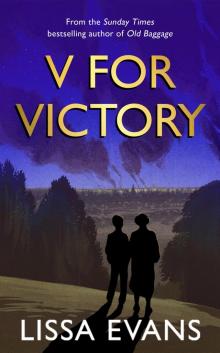 V for Victory
V for Victory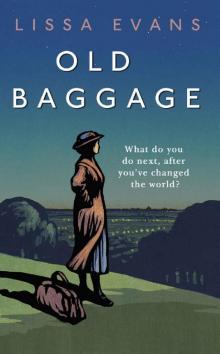 Old Baggage
Old Baggage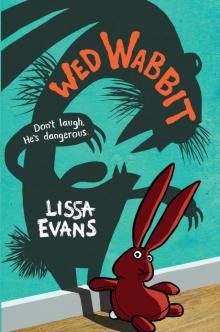 Wed Wabbit
Wed Wabbit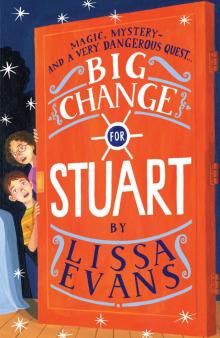 Big Change for Stuart
Big Change for Stuart Spencer's List
Spencer's List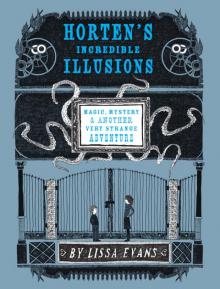 Horten's Incredible Illusions
Horten's Incredible Illusions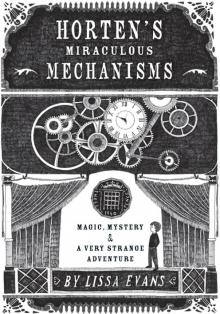 Horten's Miraculous Mechanisms
Horten's Miraculous Mechanisms Their Finest Hour and a Half
Their Finest Hour and a Half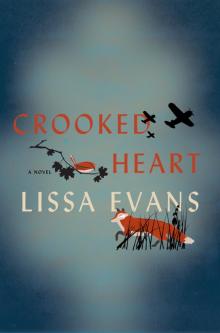 Crooked Heart
Crooked Heart